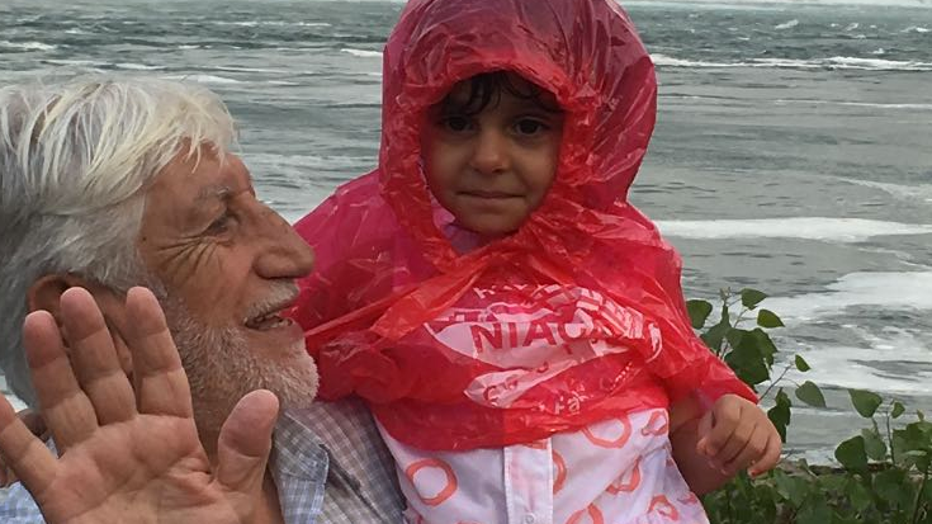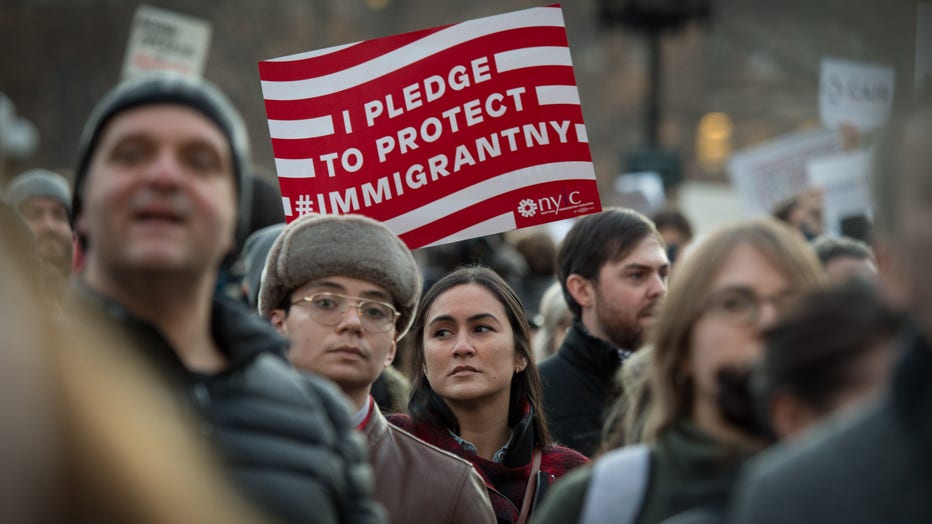Tension rises as first phase of Pres. Trump’s 'Muslim shutdown' takes shape


Dr. Mohamad Khir Ghanem father and daughter pose at Niagra Falls.
By Avi Asher-Schapiro
For the past year, Dr. Ammar Ghanem has been diligently filling out the reams of paperwork required to permanently relocate his 80 year old Syrian father to Detroit, where Ghanem lives. A Syrian-born pulmonologist, Ghanem recently became an American citizen and he wants his father to live out his twilight years near his grandchildren, Ghanem’s two sons and daughter.
“My littlest one is just 3 years old and when she talks to her grandpa over the phone she starts crying—she’s just so attached to him,” Ghanem says. “He’s getting older, and he needs to be near his family now.”
Ghanem’s father has managed to visit the U.S. three times with a tourist visa, and he was slated to receive his permanent residency status—or Green Card—within the next few months. “We were so excited for him to finally come live with us,” Ghanem said.
But everything changed on Wednesday, when a draft copy of an executive order from Donald Trump’s administration leaked to the Washington Post. It outlined the first attempt to fulfill perhaps his most controversial campaign promises: to limit the entry of Muslims, like Ghanem’s father, into the United States.
The leaked text of the executive order does not ban all Muslims outright. It suspends the U.S. Refugee Admissions Program for 120 days, places an indefinite ban on all Syrian refugees, and, according to anonymous officials who spoke to Reuters, it would block entry visas from seven countries for 30 days: Iraq, Syria, Iran, Sudan, Somalia, Yemen, and Libya. The White House has yet to comment on the text of the resolution that was leaked. But when Fox News’ Sean Hannity asked Pres. Trump about it on Thursday night, the president did not deny its authenticity. ” “So we have people in this country that will cause problems,” Pres. Trump said. “We're not going to have any more.”
The leaked document threw Muslim-immigrant communities into a panic: in New York City, the Council on American-Islamic Relations (CAIR) called an “emergency rally” which drew hundreds of demonstrators to Washington Square Park. The crowd chanted “resist,” as number of prominent public officials and activists gave speeches. “We are here to say to our Muslim brothers and sisters that tonight, today and in the future, I too am Muslim,” Rep. Nydia Velazquez (D-N.Y.) said. New York City Public Advocate Letitia James lead the crowd in a chant: “Say it loud, say it clear, refugees are here to stay.”

People hold signs as the Council on American Islamic Relations holds a protest against President Donald Trump's planned ban on Muslim travel in Washington Square Park in New York on January, 25, 2017. (AFP / Bryan R. Smith)
Meanwhile, the International Refugee Assistance Project issued an SOS, asking for lawyers willing to sprint to nearby airports and make sure refugees already in transit to the U.S. weren’t turned away—the executive order, they said, could reverse an asylum seekers fortune literally while they were in midair.
Pres. Trump began floating the notion of a Muslim ban back in 2015, when Rizwan Farook—a U.S. citizen of Pakistani descent—murdered 14 people in San Bernardino, with the help of his wife, a Pakistani citizen with a Green Card. Days after the attack, then-candidate Trump announced his plans to institute a “total and complete shutdown of Muslims entering the United States.” Over the course of the campaign, Trump dropped the religious language and instead promised to halt immigration from what he called “terror-prone regions."
It’s not clear exactly how many would be impacted by the pending executive order, but it’s not a small number. Over 50,000 Syrians alone have obtained permanent residency status in the U.S. since 2000, according to DHS statistics. One of those is Yasmin, a mother of two living in eastern Virginia—she asked for her real name to be withheld. Yasmine has been in the U.S. for the past 6 years on a work permit, and she typically visits her parents in Lebanon a few times a year so her children can get to know their grandparents. Since Pres. Trump assumed the presidency, she's been too afraid to leave the country, worried she could be barred reentry because of her Syrian passport.
“If I continue to feel like I’m not welcome here, I may leave,” she says. “I’m very very nervous about the future.”
Farah, a 26-year-old stay at home mom in New York, with Iranian citizenship and a Green Card, feels similarly. “I’d say I’m in shock,” she said. “Everyone’s just confused about what to do.” She had planned to visit her parents in Germany next month—but she’s cancelled her trip, worried Pres. Trump’s order will block her from reentering the U.S. on her Iranian passport.
In Flint, Michigan, immigration attorney Mona Jundy phone has been ringing off the hook. “Everyone’s freaking out,” she said. Jundy mostly represents Muslim immigrants and asylum seekers who are wading through the complex bureaucracy—mountains of paperwork, multi-year waiting periods, and intense background checks—that foreigners must navigate to secure legal status in the U.S.
One of her clients, a permanent residents in the U.S. with a Syrian passport, is now visiting her sister in France. She’s worried she won’t get let back into the country. “All over, people are freaking out, calling me and saying: ‘Oh my god, what am I going to do. I just took a week off of work to travel abroad—am I going to be allowed back in?” Jundy said. On Thursday, she hastily organized a conference call where she counseled hundreds of visa holders from Muslim countries to immediately come back to the U.S. — and try to outrun the executive order, which as of Friday afternoon, still has yet to be officially signed.
Although the order only suspends entries for 30 days, Jundy worriers that it's just the opening salvo in a more extensive crackdown. “We don’t know what's going to happen next—Pres. Trump can amend it, or expand it,” she says. “He campaigned on banning all Muslims, I think he’s going to try to find more legal ways to deliver on that.”
For those like Farah and Yasmine who already have U.S. visas, the executive order would not eject them from the country. But for refugees—especially those fleeing the Islamic State militant group (ISIS)— the orders could prevent them being granted asylum in the U.S.. On Friday, the Trump administration reportedly ordered the Department of Homeland Security to suspend trips by its staff to interview refugees abroad—in essence blocking the pipeline for new asylum-seekers to petition for entry into the U.S. That move is in line with the text of the leaked draft, which promises a 120-day pause in refugee admission, and an indefinite ban on Syrian refugees.
Betsy Fisher, policy director at the International Refugee Assistance Program, is worried about her clients who are fleeing ISIS. Many of them hold Syrian passports — under the new policy they would be barred from entering the U.S. in perpetuity.
“An indefinite ban on Syria's seems incredibly arbitrary,” she said. “They aren’t more dangerous or more terror prone than anyone else.”
On Thursday, Pres. Trump admitted to Hannity that most Muslims trying to enter the U.S. don’t mean to do harm. “Some people have come in with evil intentions, and you know, most haven't, I guess,” he said. “But we can't take chances. You know, the word gamble is an appropriate word. It's a big gamble.”
For Dr. Ghanem’s father’s green card application, the situation is still unclear. Although the draft document singles out Syrian refugees, it makes no mention of visas issued for family reunification. Ghanem’s hoping for the best.
“As a U.S. citizen I have the right to bring my family to the U.S.—I wouldn’t be fair to deny it to me and give it to other people just because I happen to be from Syria,” he said. “It goes against the American values they taught in my U.S. citizenship classes.”

